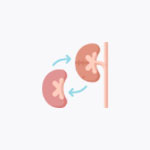Transplant Procedure in Thane
If you're exploring Kidney Transplant treatment in Thane, here's a detailed guide outlining the steps involved in the procedure:
- Admission to the hospital 48 hours before transplant.
- Assessment by a nephrologist, transplant surgeon, and anesthesiologist for fitness evaluation.
- Lymphocyte crossmatch test to verify the absence of preformed antibodies in the recipient toward donor cells; the results are rechecked and confirmed.
- If deemed fit in the final assessment, with a negative repeat crossmatch and no active infection, initiation of immunosuppressive medications to prevent kidney rejection.
- Hemodialysis session 24 hours before the operation to optimize creatinine, electrolytes, and water status for safe anesthesia and surgery.
- Reassessment of CBC, electrolytes, PT, PTT, and X-ray chest to ensure the same optimal conditions.

Looking for the Transplant Procedure in Thane
Operation Procedure

Surgical Technique:
In the case of a living donor, the nephrectomy (removal of the kidney) is executed using laparoscopy for a minimally invasive approach. Typically, the left kidney is preferred for donation. Following removal, the kidney undergoes prompt flushing with a preservative fluid and is then cooled and preserved on ice. In instances involving a deceased donor, where the kidney is surgically removed along with other organs and transported in perfusion fluid and ice, a meticulous examination takes place. This includes the removal of clots and blood, and the preparation of the renal artery and vein for subsequent attachment in the recipient.

Recipient Procedures:
The transplanted kidneys are usually positioned in the right iliac fossa. The donor kidney's artery is meticulously joined to the recipient's external/internal iliac artery, while the donor's vein is connected to the recipient's external iliac vein. Following this surgical union, the recipient's blood begins flowing through the transplanted kidney and initiates filtration. Once the kidney's blood supply is established, the ureter is implanted into the bladder through a carefully created and sutured opening. Typically, a ureteric tube (stent) remains in the ureter to the bladder, with removal scheduled after 4 weeks. Both donor and recipient surgeries are conducted under general anesthesia. It's noteworthy that native recipient kidneys are usually retained, unless circumstances necessitate their removal due to issues such as stones, infection, or size mismatches.
Following the removal of anesthesia, and when both donor and recipient can breathe independently, ventilators are discontinued. Subsequently, they are shifted to the ICU, where hourly monitoring focuses on fluid balance, urine output, BP, and respiration. The recipient continues with immunosuppressive drugs.
Post-surgery, the donor is shifted within 2 days and discharged within 4-5 days. The recipient undergoes a 4-day ICU stay, followed by 6-7 days in the ward. The removal of the urine catheter occurs on days 3-5, and the drain tube, responsible for draining accumulated fluid or blood at the surgical site, is removed when drainage ceases. Daily monitoring for CBC, renal function, and blood sugars in both the ICU and wards is standard. Patients receive comprehensive education on postoperative care, precautions, medication dosage, dietary guidelines, and are provided with a schedule for follow-up visits and continued monitoring.
Complications after kidney transplant

Rejection:
Rejection remains a critical concern in the aftermath of kidney transplant surgery. As the recipient's bloodstream integrates with the newly transplanted kidney, the body's defense cells identify these organs as foreign entities, triggering a defensive response aimed at their removal. To counteract this natural rejection process, recipients are prescribed immunosuppressive medications. The advent of potent drugs has significantly mitigated the rejection rate, now standing at less than 10%, with an impressive 90% of rejections being reversible. Signs indicative of potential rejection include a decline in urine output, elevated creatinine levels, fever, or tenderness over the kidney. Diagnostic confirmation involves a biopsy of the transplanted kidney. While the immunosuppressive drugs diminish the recipient's immune defenses, rendering them more susceptible to infections, prophylactic measures are implemented to safeguard against these risks. Adherence to precautions, such as wearing masks and practicing thorough handwashing, is crucial. In the event of symptoms like fever or breathlessness, recipients are urged to promptly reach out to their transplant team for immediate detection and intervention. The completion of vaccinations two weeks before the transplant is strongly recommended to bolster overall immune resilience. Despite the complexities associated with rejection, advancements in surgical techniques have significantly reduced the occurrence of early complications such as clot formation in the renal artery or vein and urine leakage around the kidney. The incidence of such instances occurring is minimal, approximately 3-5%.
Long-Term Complications:
- Obesity, infections, heart attacks, strokes, and side effects of steroids (osteoporosis, cataracts) are observed as long-term complications.
- Chronic rejection can lead to total failure of the transplant kidneys.
- Rarely, kidney transplant patients may develop cancers as a complication of immunosuppressive therapy.
Life After Kidney Transplant
A kidney transplant serves as a transformative milestone, significantly enhancing patients' overall quality of life. However, navigating life post-transplant involves a thoughtful adherence to certain practices and measures to ensure sustained well-being.

Regular Follow-ups:
Ensuring a seamless transition into post-transplant life necessitates a commitment to regular follow-ups with your nephrologist, particularly during the initial months. These follow-ups serve as a vigilant monitoring system, assessing the body's response to the transplant and identifying any potential complications that may arise. Adhering diligently to your doctor's advice and attending all scheduled appointments is critical for ongoing success and health maintenance.

Immunosuppressants:
Recognizing the body's innate tendency to reject foreign objects and organs, the integration of immunosuppressant medications becomes paramount. This proactive measure serves to mitigate the risk of organ rejection, underscoring the importance of consistent adherence to the prescribed immunosuppressive regimen.

Hygiene and Lifestyle:
An integral aspect of post-transplant life revolves around cultivating a lifestyle conducive to recovery. Staying active and embracing good hygiene practices emerge as vital contributors to the overall recuperation process. A commitment to a healthy lifestyle entails engaging in regular physical activity, adopting a well-balanced diet, and steering clear of detrimental habits such as smoking and excessive alcohol consumption. By embodying these principles, individuals can fortify their journey toward sustained well-being after a kidney transplant.
Embarking on a journey of well-being post-kidney transplant entails mindful adjustments to daily life, fostering habits that ward off complications. Here are key recommendations to ensure a vibrant and health-conscious lifestyle:
Embracing Life After Kidney Transplant

Eat a Healthy Diet:
Prioritize the consumption of nourishing foods, emphasizing fresh fruits, vegetables, and whole grains. This dietary choice not only fuels your body but also contributes to overall fitness and well-being.

Quit Smoking:
Recognizing the perilous association between smoking and an elevated risk of cancer and various health issues, it is imperative to bid farewell to smoking. By taking this decisive step, you safeguard your health and reduce potential complications.

Weight Management:
Addressing weight concerns is crucial, as being overweight or obese heightens the risk of cancer and various health challenges. Engage in regular physical activities, such as exercise and yoga, fostering a lifestyle that supports weight maintenance and overall health.

Adherence to Medical Guidance:
Listening attentively to your doctor's advice and instructions is of paramount importance. This conscientious adherence not only acts as a preventive measure against infections but also accelerates the recovery process. By aligning with your medical team's guidance, you play an active role in safeguarding your health and ensuring swift recuperation.
Success rate and life expectancy after kidney transplant:
Because of progress in surgical techniques and the availability of novel and potent immunosuppressive drugs, overall care survival after kidney transplant has significantly improved
Living donor kidney survival:
- 1 year – 97%
- 5 year: 88%
- 10 year 80%
Deceased donor kidney:
- 1 year – 97%
- 5 years: 80%
- 10 years: 72%
Causes of death
- Cardiovascular disease (heart attack/stroke) - 42-47%
- Infection- 15-18%
- Cancers- 9-15%
- Unknown- 23-31%
Choosing the Ideal Kidney Transplant Center
When selecting the optimal kidney transplant center, meticulous consideration of various factors is pivotal. Here are key aspects that will help you in your decision-making process:
Consultation and Patient Experiences: Seek opinions from multiple doctors to gather diverse perspectives. Engage with individuals who have undergone kidney transplants at the hospital, gaining valuable insights into their experiences.
Expertise in Living or Deceased Donor Transplants: Assess the center's proficiency in both living and deceased donor transplants, ensuring comprehensive capabilities.
Reputation and Mortality Rate: Scrutinize the hospital or center's reputation, emphasizing its mortality rate concerning kidney transplant patients. A track record of successful outcomes is indicative of reliability.
Insurance Coverage: Confirm whether the hospital or center falls within the coverage of your insurance policy. Clarity on financial aspects ensures a smoother process.
Experience in Kidney Transplant Cases: Gauge the cumulative experience of the hospital or center in handling kidney transplant cases. A wealth of experience speaks to their competence and proficiency.
Enduring the impact of a debilitating disease is an arduous journey, not only for the patient but also for their family. For those opting for dialysis, the financial toll can be substantial, with an average monthly expenditure of Rs. 25,000 for 7-10 sessions. Choosing the path of a kidney transplant holds the promise of significantly enhancing the patient's quality of life, but understanding the associated costs is crucial.
Cost Analysis
In India, the average cost of a kidney transplant ranges between 7-10 lakhs approximately. It is paramount to engage with your insurance company to ascertain whether the transplant cost is covered within your plan. Several factors contribute to the overall cost analysis:
- Hospital Infrastructure and Location
- Organ and Transport Charges
- Length of Stay in Hospital
- Expertise of Surgeons and Team
- Use of Advanced Technology
- Health Complications
- Recovery and Rehabilitation
- Post-Transplant Medications
For patients traveling from their hometowns to the hospital, the cost of accommodation near the medical facility adds another dimension to the financial considerations. Over the course of several months, these accommodation expenses accumulate, further influencing the overall financial landscape of kidney transplantation.
By comprehensively understanding and evaluating these cost factors, individuals and their families can navigate the financial aspects of kidney transplant, making informed decisions that align with their health and financial well-being.

Do You Have Any Query
Please fill out the form & our representative will contact you within 24hrs.
















 View Map
View Map Book an Appointment
Book an Appointment Find a Doctor
Find a Doctor Health Check-up
Health Check-up



 Find a Doctor
Find a Doctor Health Checkup
Health Checkup Book an Appointment
Book an Appointment